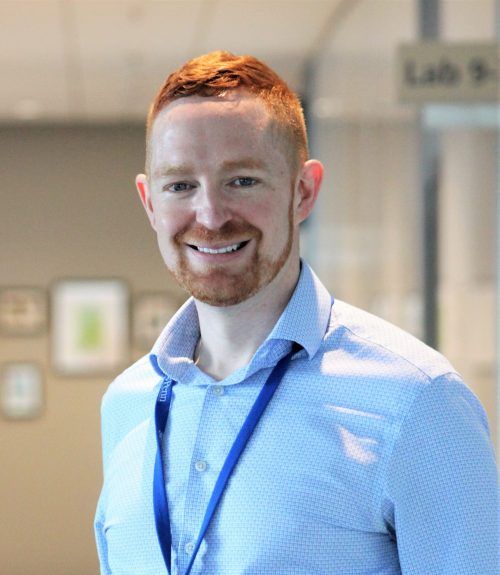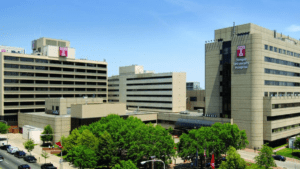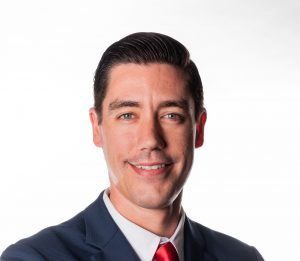
5 Questions with Neil Sheppard, Immunologist, University of Pennsylvania
“5 Questions With…” is a weekly BioBuzz series where we reach out to interesting people in the BioHealth Capital Region to share a little about themselves, their work, and maybe something completely unrelated. This edition features 5 Questions with Neil Sheppard, Immunologist, University of Pennsylvania.
Neil Sheppard is an Immunologist educated in the UK at the Universities of Bristol and Oxford. He has over 18 years’ experience in the fields of vaccines and immunotherapies, including over a dozen years leading drug discovery and development programs in Big Pharma and Biotech.
Neil’s expertise draws on time in the UK, Australia, and both the East & West Coasts of the USA. Since 2015, Neil has focused exclusively on CAR and TCR therapy for cancer, during which time he has led multidisciplinary teams and taken assets into the clinic at GSK and Tmunity. In 2019 Neil returned to academia to take up a role at the UPenn Center for Cellular Immunotherapies.
1. Walk us through your background from College through Industry to what you’re doing now.
As a first-generation college student, I obtained my Bachelor’s degree in Immunology with Study in Industry from the University of Bristol (UK) in 2002, spending my industry year at GlaxoSmithKline. I subsequently obtained my D.Phil in HIV Vaccine Research from the University of Oxford before joining Pfizer’s Vaccine Research organization in 2007.
My time at Pfizer brought an opportunity to move from the UK to La Jolla, California, where I led several vaccine research programs for HIV, influenza, and streptococcus. In 2013, I was 1 of 12 successful candidates from over 1,200 applicants to join GSK’s flagship ‘Esprit R&D’ talent development program, a global, rotational program which challenges participants to develop a breadth by taking on stretch goals in new fields of research or disciplines within GSK’s R&D organization.
During my first rotation on the program, I led a small molecule-based regenerative medicine program in cartilage repair in Philadelphia, my first foray into small molecule drug discovery. Next, I moved to Sydney, Australia, to gain experience in the clinical and regulatory side. Finally, in 2015 as employee number two in GSK’s new Oncology Cell Therapy R&D unit, I helped build the unit and drive its strategy and partnerships.
This led to me becoming a full-time member of the unit after the Esprit Program, where I led several TCR-T and CAR-NK cell therapy programs, including the NY-ESO-1 TCR-T program we acquired from Adaptimmune after our team made the business case and took it through GSK’s various governance bodies to a successful opt-in decision.
Hungry for a faster-paced environment, in 2018, I joined the UPenn spin-out company Tmunity as a CAR-T Program Leader. At Tmunity, I gained true hands-on biotech experience, drafting sections of the Investigational New Drug application and Investigator’s Brochure for the program I was leading and seeing it successfully get into the clinic and start treating patients. It was wonderful to roll up my sleeves and get involved in ways that are not easily possible in Big Pharma, where large teams of specialists are responsible for delivering each indepenent aspect of a program.
Via my time at Tmunity I built strong relationships with the company’s founders at UPenn, and wanting to get closer to the science in October 2019, I accepted an offer to join the UPenn Center for Cellular Immunotherapies, reporting to none other than professor Carl June MD, the inventor of the first approved CAR-T therapy CTL019, which went on to become know as the drug Kymriah®.
2. You’ve been at the University of Pennsylvania for just over a year now and wearing a few different hats. Tell us a little about each role.
Indeed, wearing different hats was something I enjoyed in industry, and have been keen to continue at UPenn. I essentially have three hats at UPenn, though they don’t require an equal share of my time. My primary hat is leading a section of June’s laboratory known as the T Cell Engineering Lab (TCEL), which comprises eight scientists, including grad students, postdocs, and research staff working on cutting edge and translational projects. My next biggest role is leading the strategy for a clinical-stage CAR-T program, which involves working with multiple stakeholders to select and develop concepts for testing in the clinic. My third role is to facilitate partnerships that allow us to access exciting technologies that will help CCI remain at the forefront of cell therapy.
3. What would you tell somebody about the BioHealth Industry around Philadelphia that they probably didn’t know?
Its roots go back a long way. Indeed, Smith Kline & French, part of current-day GlaxoSmithKline, was born in Old City Philadelphia in 1830. As a major industrial city, Philadelphia was home to a significant number of chemical and pharmaceutical outfits. Over time these morphed into numerous Big Pharma and Agrochemical companies that still call the Greater Philadelphia region home to this day.
Moreover, Philadelphia benefits from a number of globally significant scientific and clinical anchor institutions, including UPenn, CHOP, and the Wistar Institute, attracting and developing a significant hub of talent. While biotech in Philadelphia is undergoing an explosion due to cell & gene therapies, in particular with the region dubbed ‘Cellicon Valley,’ there were some notable earlier successes, including Centocore Inc, which was acquired by J&J in 1999.
4. What is a project that you’ve been working on that you’re most excited about? Tell us about it.
That’s a tough question as I am genuinely excited about all the projects we’ve selected to work on in my lab, and they are necessarily early as we started most of the projects in 2020. I will therefore choose a clinical collaboration. We hope to embark on designed to profoundly change the tumor microenvironment in patients and, in so doing support the action and survival of CAR-T cells in tumors. We anticipate this novel combination may lead to a signficant advance by demonstrating the value of such combinations and leading to various iterations of the approach to improve efficacy.
5. If You Had A Time Machine, Would You Go Back In Time Or Into The Future? Why?
While it would be exciting to visit the future and see how cell & gene therapy and other advancements playout, it seems like an element of cheating as you wouldn’t be able to unsee what you had learned, giving you an unfair advantage when you returned.
I’d rather go to the past – perhaps the second half of the 19th century or the first half of the 20th century. I love reading historical novels or factual accounts of this period when mind-boggling scientific and industrial advances were being made on multiple fronts, and the world was decisively moving from its agrarian past to modernity.
On the scientific front, it would be amazing to visit Louis Pasteur as he disproves the theory of Spontaneous Generation of life in his laboratory in 1859 or to visit Paul Ehrlich in 1910 as he conducts the first-ever high throughput drug screen and discovers a magic bullet, Salvarsan (a name based on ‘salvation’) as a cure for syphilis, still 25 years before the dawn of the antibiotic era.
In some ways, I think people were more open-minded in that time – science and spiritualism were an ‘and’ rather than an ‘or’ as they tend to be today. That said, as a gay man, I am all too aware of the difficulties and injustices that existed in the past, and for many communities continue to exist to this day, so perhaps my visit to the past could be a brief one.
Thank you to Neil Sheppard for participating in the ‘5 Questions with BioBuzz’ series and stay tuned for more interviews with others from across the BioHealth Capital Region and beyond.




